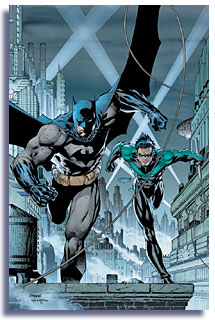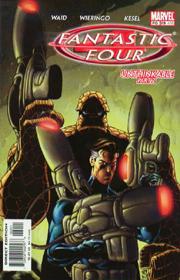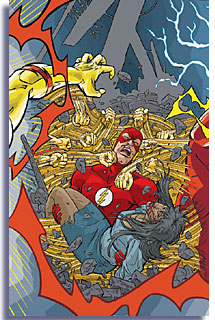|
Hey
Kids! Comics!
Hey, it's
been a while. Sorry about that. Or maybe you haven't noticed.
And I'm sorry about that. The past few weeks have been
kind of crazy, and just as I almost had myself on track for
comics reviews, more craziness happened. So accept this as the
beginning of my comeback, and I promise to update more.
Batman
#615
writer: Jeph Loeb
artists: Jim Lee and Scott Williams
After
a pretty much over-hyped confrontation with The Joker last
issue, Loeb and Lee step back and address the possible criticisms
of "Hush" so far. In some ways, it's clever, but the trick
also calls attention to some of the most comic booky things
going on here.
Yes,
it is strange, even for the emotionally constipated
Bruce Wayne, that nobody had ever heard of life-long best
friend Tommy Elliot. Several pages try to make sense of it.
But really, it feels like Loeb overcompensating for an obvious
plot device (or a labored attempt to put his own spin on the
mythos).
Instead
of calling attention to it, he should just move on, because
some neat things are happening. Through his characterization
of a man awkwardly trying to merge his two halves, Loeb has
made his mark. We can wish that Bruce had a more finely developed
sense of poetry, but he doesn't. Why would a guy obsessively
devoted to fighting crime have developed a taste for the fine
arts more finely than a high school student? And yet his reading
of "O Captain, My Captain" is no doubt from the heart.
Conversely,
it makes sense that Selina does have a real appreciation for
the finer things in life. Could her fascination with Batman
survive knowing his secret? Dick Grayson, Leslie Thompkins
and Alfred all seem to think so, and that soap operatic element
works.
Lee throws
in his nods, too, including a nice view of every Batmobile
ever designed. It's a cool moment for fans, and yet a little
disconnecting. It's hard to get lost in a serious comic book
that keeps reminding us it's just a comic book.
And yet
the art remains beautiful, some of Lee's strongest. At the
same time, some weaknesses come into play; The Riddler looks
awkward not just because Edward Nigma isn't an overmuscled
guy; it feels like Lee has a hard time drawing him.
There's
also a significant game piece meant as a recurring symbol,
but it doesn't look like a chesspiece; if anything, it's as
if somebody in the DCU had combined Stratego with HeroClix.
Can anybody straighten me out on this one?
The real
revelation is in the mystery villain. Like what Rucka has
been doing over in Detective, Loeb is mining the golden
age for ideas. But that's okay. Everything old is new again,
and the veteran writer has put a good spin on it.
If The
Joker confrontation disappointed you, don't give up yet. This
multi-part storyline really does look like the whole will
be greater than the sum of its parts. And if we're lucky,
the growth Loeb is trying to inject will stick.
Rating:

Fantastic
Four #69 (498)
writer: Mark Waid
artists: Mike Wieringo and Karl Kesel
As he
tends to do extremely well, Waid has gotten to the heart of
yet another comic book character's motivation. The classic
conflict between Doom and The Fantastic Four has at its root
vanity. And though the seeds for "Unthinkable," the current
arc in this book, have been lying around almost since
Dr. Doom's first appearance, it's amazing that nobody has
thought to take it to this logical conclusion before.
So amazing,
in fact, that even Ben Grimm comments on it.
But unlike
this week's Batman, where such commentary points out
weaknesses in story construction, The Thing is really only
chiding Reed Richards. Whatever Doom does that will turn out
to be unthinkable, it's clear that the title also refers to
Reed's inability to counter it. When an enemy uses magic,
Mr. Fantastic has no defense.
"Nobody
likes feelin' stupid. Just ask Victor." And this whole situation
makes Reed feel very, very stupid indeed.
Without
much in the way of bells and whistles, Waid has also returned
The Thing to being the most human member of the foursome,
with the best insights into the heart. Though consistently
portrayed as being self-deprecating, he has mastered humility
in its best sense. The Thing knows when to ask for help.
And if
anything will save The Fantastic Four, it's that Victor Von
Doom does not. He will ally himself with demons (who bear
a suspicious resemblance to some recurring JLA foes - but
maybe that's just me), but he will not bow down to them. Anyone
with cursory knowledge of Hell knows that's a dangerous position
to take.
To paraphrase
Brian Michael Bendis' oft-quoted advice for writing, Waid
has brought his Imaginauts to the realm they least want to
be. Making it all work, of course, are Wieringo and Kesel.
The two
have a bright, clean style, even when depicting Hell, that
won't let us forget that this comic is meant to be fun. And
Wieringo's redesign of Doom hearkens back to the best of Kirby's
original drawings in its simplicity. The character has turned
his back on technology, and the new look reflects that.
Even
venturing into dark territory, this book works as high adventure
and again, it's just damned fun. Thank heavens, too, that
Joe Quesada is about to return it to its original numbering.
The Fantastic Four has a rich legacy, and the current
run deserves to take its place as a huge high point. Finally,
the heroes have really returned.
Rating:

The
Flash #198
writer: Geoff Johns
artists: Scott Kolins and Doug Hazlewood
Can't
The Spectre ever just drop in to say "hi?"
Or maybe
he did this issue; he just can't do it without generally being
creepy. Not that anybody in Keystone City notices. They're
so busy attending a Flash-family gathering that Hal Jordan
can easily just swirl his cape, say something ominous and
then disappear without so much as a nod from Bart.
Obviously
a lot of comics play off that family element (and in a weird
way, even The Spectre fits the bill here), but Johns gives
it a special weight in this book. We even have the red-headed
stepchild in the form of Jesse Quick. For those new to the
book, Johns deftly explains just how these relations all work,
possibly in time to explode them all.
As a
result, though, half the issue is spent going back over information
many of us already know. There's dramatic irony in Wally agonizing
over the destruction of The Flash Museum and tying it to Hunter
Zolomon, but, like Zolomon's transformation itself, it feels
a little forced.
However,
there is something cool about Zoom. I could be wrong, but
it looks like he hasn't quite mastered (or cared to master)
the subtler aspects of his power. He moves too fast because
he simply can't move slowly anymore. Maybe it's part of his
challenge to Wally, that the scarlet speedster has to literally
catch up in order to catch up.
Of course,
The Spectre's appearance hints that Wally won't figure it
out in time. But we've been down that road before, a couple
of times in Johns' hands, too. So the book remains a treasure
of characterization, but even with a new Zoom, it's hard to
feel like we're seeing something all that new.
Rating:

|








